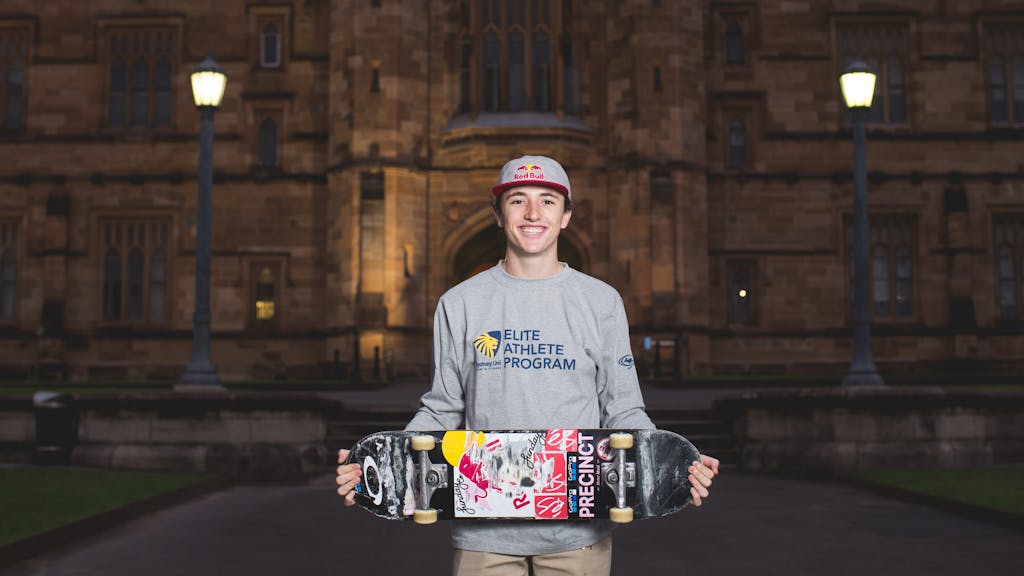
Cover photo: Sydney Uni Sports & Fitness
Since it was confirmed that skateboarding would feature at the Tokyo 2020 Olympic Games, Australia has wasted no time getting ahead of the competition. As a country with deep roots in sporting success and a nationally ingrained competitiveness, skateboarding's elevation to the Olympic level has seen its importance quickly skyrocket within the nation's sporting circles. Shane O'Neill was recently endowed with a hearty sum of money as an incentive to compete for Olympic gold. It seems that all of a sudden, those pests on four wheels are worth something.
It was perhaps only a matter of time, then, that we'd see university scholarships for skateboarding. The University of Sydney, Australia's oldest and arguably most prestigious academic institution, announced last week that two skateboarders had been granted full scholarships to attend the university and further their aims for Olympic qualification in 2020. Amar Hadid, a rising star in the women's vert scene, was one of those selected. The other was Mikey Mendoza, a 19-year-old street skater originally from Queensland, who now resides in Sydney. We caught up with Mikey to get the details on the scholarship, how the Olympic system will work, his thoughts on the future direction of skateboarding, and his journey towards this hard-earned achievement and beyond.
Boardworld: Hey Mikey. Can you tell us a little bit about the scholarship? What exactly does it entail? What benefits or resources is the university providing?
Mikey: The University of Sydney has a huge variety of sporting scholarships, however the most notable in terms of support and prestige for athletes is the scholarship I've been awarded, which is "The Elite Athlete Scholarship". Those who have been placed on this scholarship tend to become Olympic representatives in their sporting career – University of Sydney sent 30 Olympic athletes to the Rio Olympics last year and a great deal of them won gold. Its purpose is to support athletes in every way possible to ensure that even with their extensive commitment to their sport, academic excellence can still be achieved.
So what do they give me? Academic support in the form of free tuition, special considerations if I'm traveling or competing which allows me to take up to a month off uni at any given time, full access to the university training facilities and their brand new multi-million dollar high performance gym, access to a full-time personal trainer, a nutritionist and a sports psychologist.
Yeah. To put it into perspective, a skateboarder has never been recognised as 'elite' up until now. And I've found this unfair as the same level of commitment if not more goes into the pursuit of a professional career in skating as it does in any other sport – I think skateboarders deserve it. I’ve held the goal of changing the public's and at least one educational institution's perspective since day one and I’ve gone about that in a multitude of ways. Along with everything I've achieved in skating, I made sure that my achievements in the world of academia spoke twice as loud.
I'll be taking it upon myself, with the help of my sponsors and other players in the game, to build a skate program that protects the core nature of skating. I see it as an art as much as a sport. It’s super important to me that skating's roots in street culture are built into the program, too, ensuring future developments on campus can be suited to and made with a street skating approach in mind. I think the days of security guards chasing you out of spots has passed, at least at Sydney University.
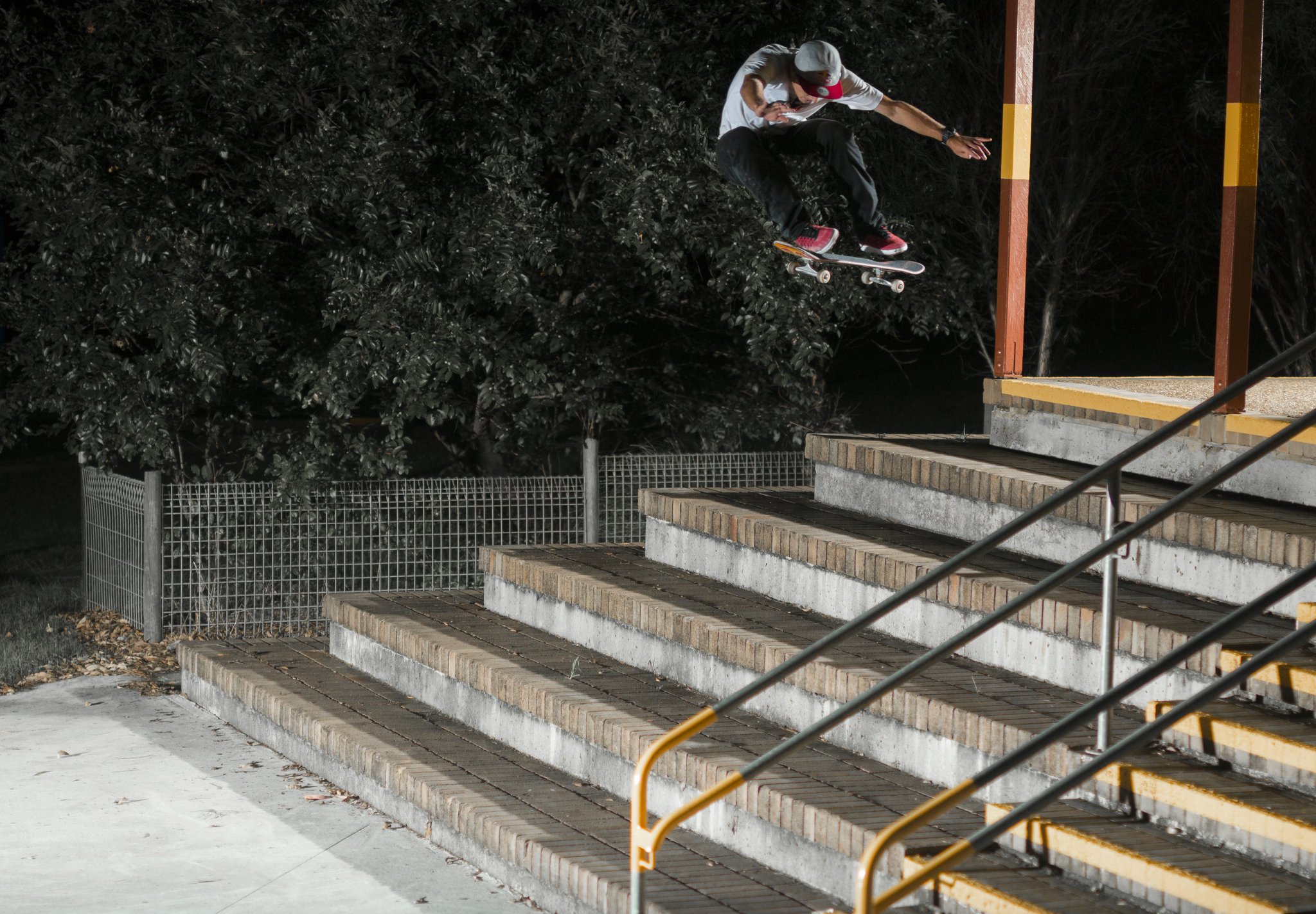
Nollie flip. Photo: Markin / Red Bull Content Pool
How did you manage to organise the scholarship? Did the university approach you, or did you go to them? Was it through the help of your sponsors?
Like any hopeful applicant, I applied through their website. But I knew without reinforcing why I should be their first skateboarder I would probably fall between the cracks, so I didn't stop there. I approached them further with the help of Darren Hughes (co-owner of Monster Skatepark and member of ASF). We sat down multiple times and really worked on why they should introduce skateboarding, how they could use the increasing popularity of skateboarding to showcase their university as a modern day uni, one that looks past outdated stereotypes. And the truth is, remaining current for any organisation is worth its weight in gold. Red Bull helped a fair bit too, their internal connections with the Elite Athlete Program, particularly the university cricket team, helped open some valuable doors. I'm super fortunate to have so many friends willing to help me make a difference.
Is this the first scholarship of its kind in Australia? The world?
Definitely an Australian first, and I'm pretty sure it's a world first too. Believe me, I think this breakthrough has just knocked over the first domino within a long line of universities to jump on board. Best believe once the uni has more skateboarders part of the scholarship in the next few years – when a skatepark is built on campus, I'll be knocking on the doors of every uni both here in Australia and internationally so that this can happen elsewhere else if it hasn't naturally already.
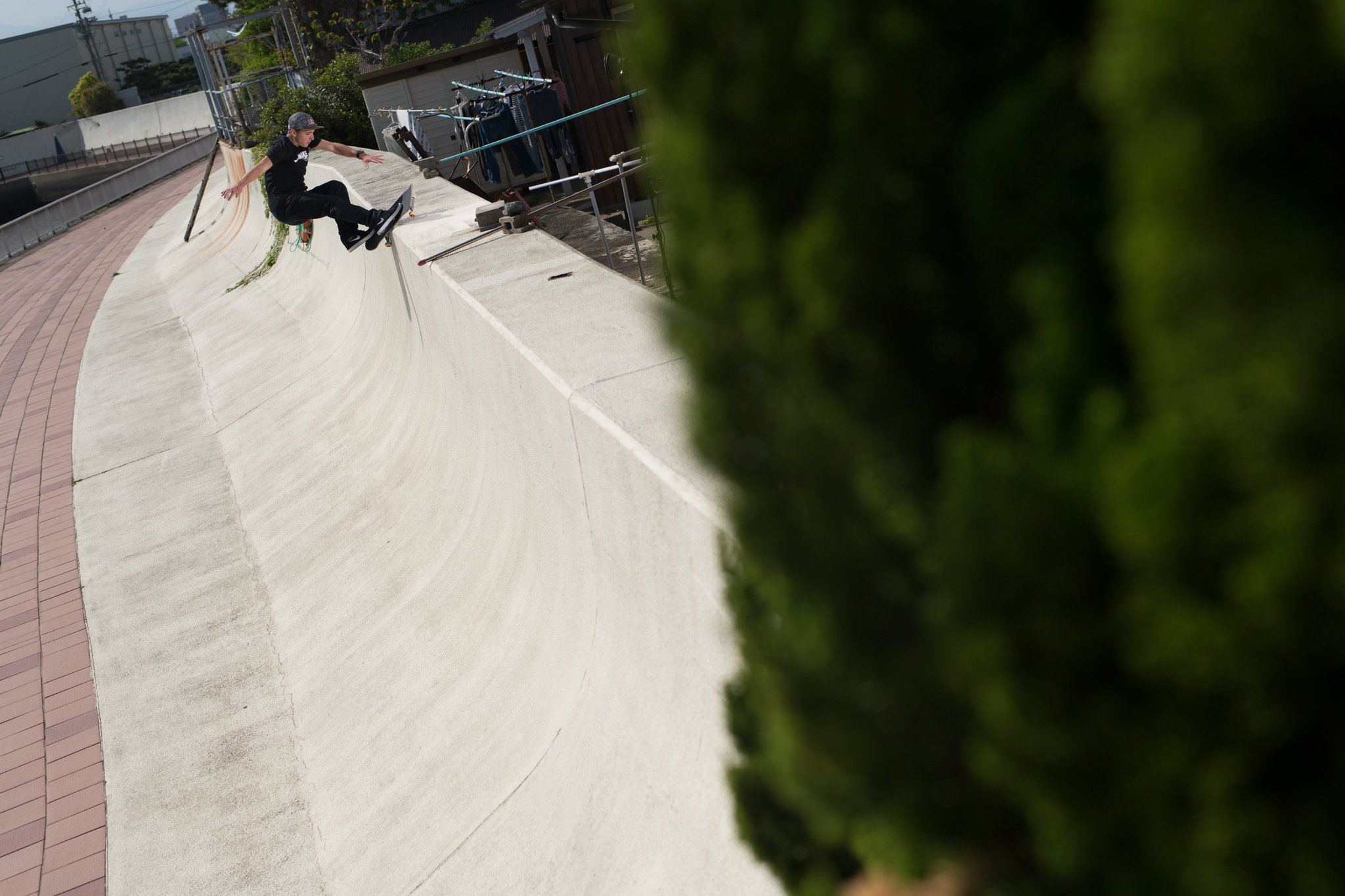
Front feeble. Photo: Markin / Red Bull Content Pool
I think if anybody had an opportunity to represent their country they would. Olympic qualifications will most likely be run through the ASF (Australian Skate Federation) with the support of the dudes from Skatepark of Tampa so I know it'll be legit, it'll feel like a usual proper skate qualifying contest. I can't wait though, I'm definitely looking forward to taking the steps towards representing Australia in 2020. I’ve also been picked as a potential candidate by the ASF for the Olympics, so I've been short-listed along with Australia's best male and female skateboarders and we've been selected to attend the first of three Olympic camps in Melbourne in May. The Australian Institute of sport will be running the camp – really looking forward to it all.
Yeah. They're running this camp to give us all the information regarding how it's being run, what we must do to make it and qualify officially, although it's somewhat vague what's happening over the weekend. The AIS are there to run a training session, to talk about nutrition and what it means to be an elite sportsperson in 2017. We'll most likely be hitting up parks too.
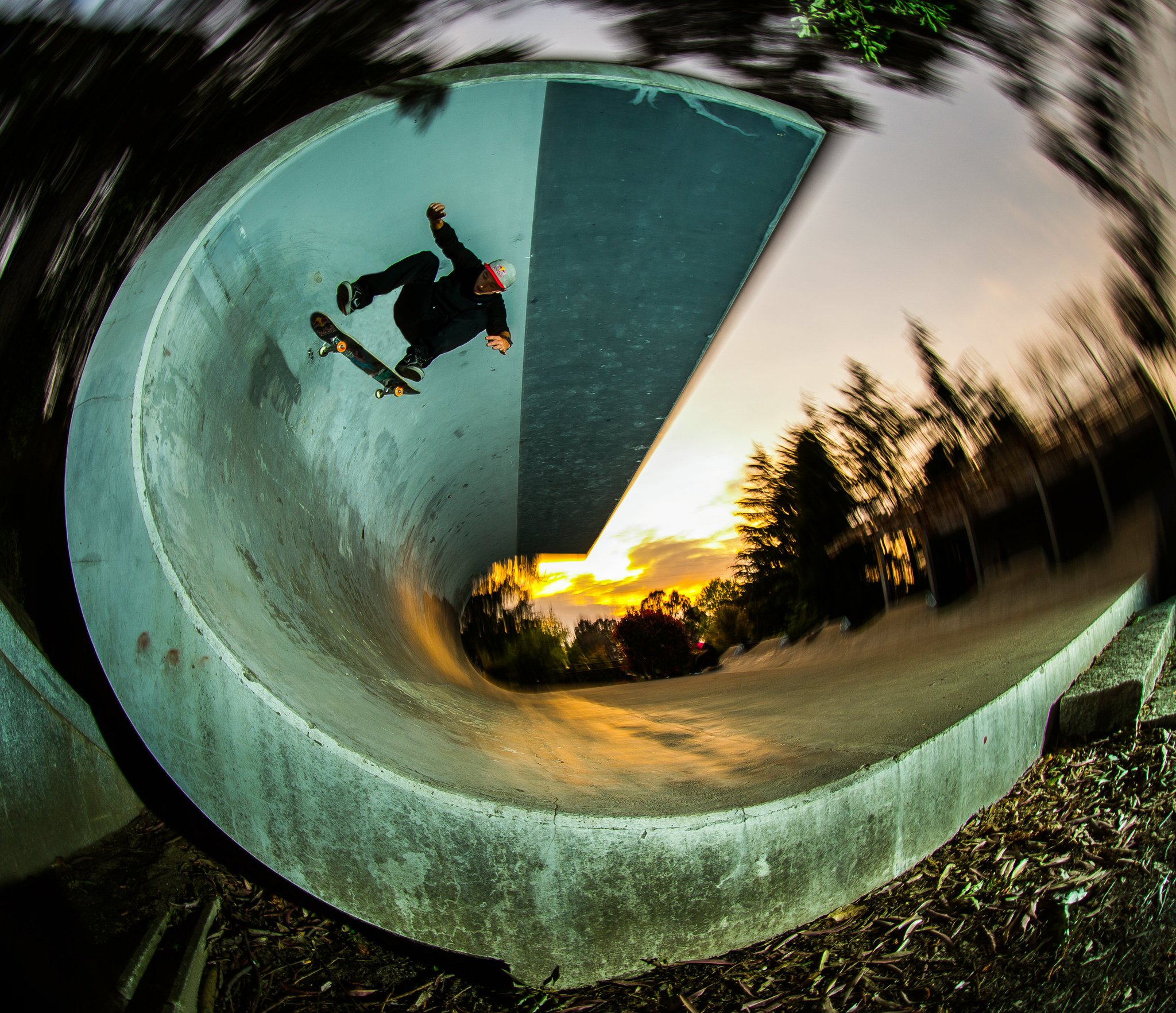
Backside flip, Japan. Photo: Markin / Red Bull Content Pool
To be honest, I think any student who skates would consider having your board confiscated as a solid buzzkill. Or just being looked at a certain way for simply being a skateboarder, that can suck too. I decided to do something about that. If anybody were to label this "overkill" you'd have to stop and ask yourself this: skating is filled with risk, it's what's makes skateboarding, well... skateboarding. We all love it for these kinds of reasons, it makes it real. But not everybody goes pro or lives out the glory in Street League. After all the sacrifices you make to forge a solid skating career, it still doesn’t mean you’ll be able to live off it at all.
So, after you've dedicated yourself to 15 years of skating, your real-world skill sets may not be as rounded as your peers – how can you break into jobs that require tertiary skills? Skills you sacrificed to skate? There’s been a definite split between education and skating – really up until now you’d chose one or the other, if you seriously wanted to "make it" in skating. But it doesn't last forever, and a trade job would be one of your only choices after skating. This is a common trend in a bunch of skateboarders who went pro and absolutely ruled, and the Australian skate industry owes a lot to those guys.
But after years of hucking, heavy slams and everything in between, how can you remain competitive in a trade that requires these insane levels of physical exertion? What if you suffer a bad injury skating? Your body can get pretty beat from skating – and do you think ex-football players would have TV presenting jobs or media jobs if they didn't study while playing? Being limited to jobs like brick laying or concreting after a skating career isn’t really ideal. I have the opportunity to study while pursuing a skate career, and these are points people may be missing if they see it as 'overkill'. Skateboarders are among the most creative and intelligent people around, and now that the line between study and skating is being slowly removed, I could only imagine the difference skaters will make in jobs that may have previously existed only as a pipedream.
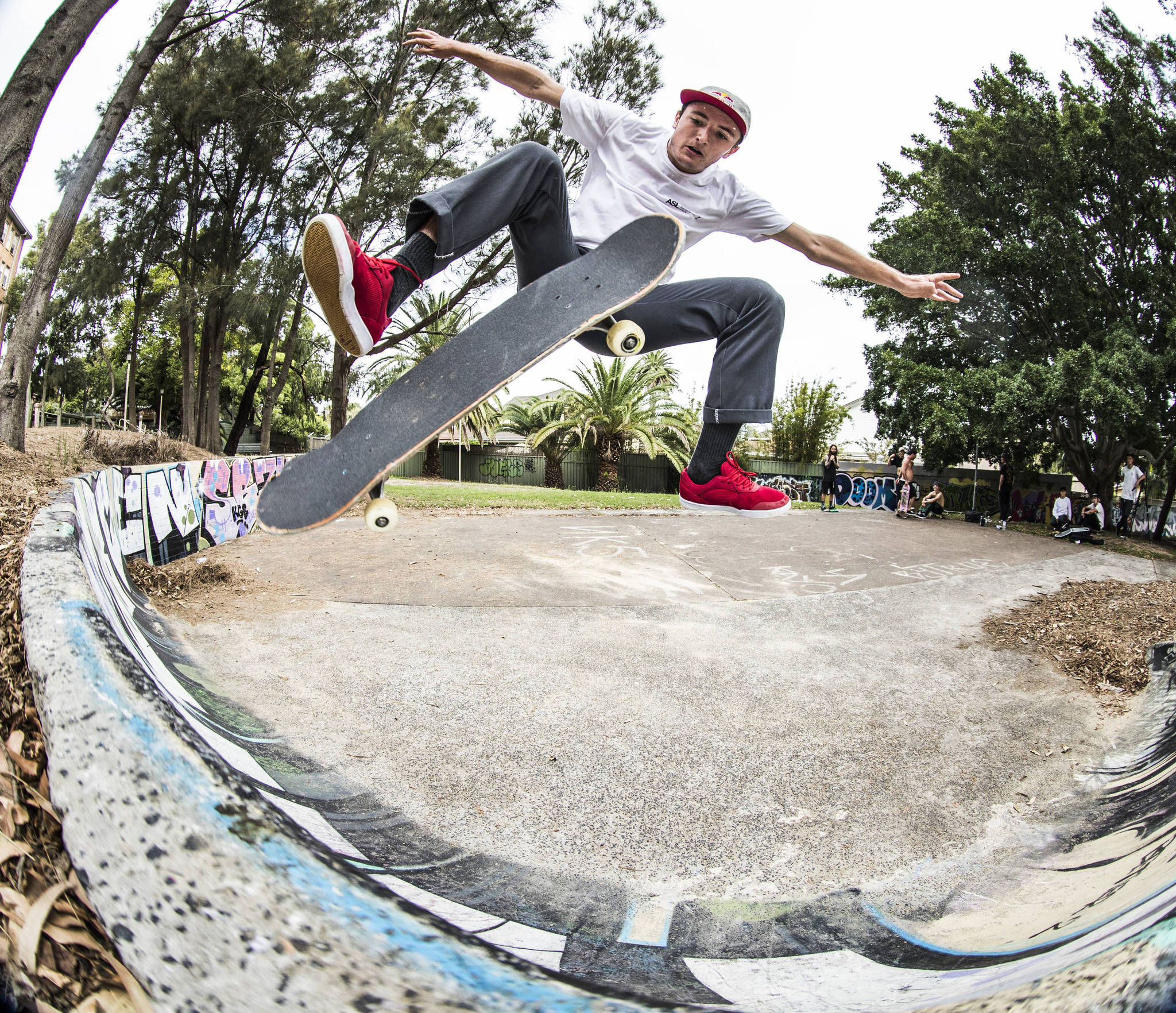
360 flip to fakie. Photo: Markin / Red Bull Content Pool
For sure. I definitely think the University of Sydney has become the trailblazer, their open-mindedness towards the introduction of skateboarding is incredibly inviting to any high school student, it sends a real message that the students matter – as individuals we all have different goals and aspirations and USYD recognises this. I think that once the skate side of Sydney Uni takes off, other universities will introduce skateboarding because potential students will see them, like USYD, as a modern day university, a 'cool' university. And if they don't there's a possibility that they could be left in the dust.
I'm actually working with Red Bull in doing an "Unlocked" event in Sydney Uni itself, making the skate-stopped spots skateable again and holding a contest or video contest. It's still up in the air. That's one example of how one of my sponsors are engaging with the uni. And the spotlight on skating in a uni will most likely inspire people to skate themselves. After all, they're not going to be subjected to people viewing them unfairly. In the past I definitely think sponsors and certain brands have played a part in creating that educational void in Australia. Sponsors can place a lot of pressure on skaters to focus on skating alone – I've been riding for some pretty 'big' brands since I was 12, and a fair bit of pressure is laid on your shoulders. One former sponsor in particular didn't view my schooling as something that was important, suggesting I should “just do” skating. Hopefully that mindset is changing with advancements like this.
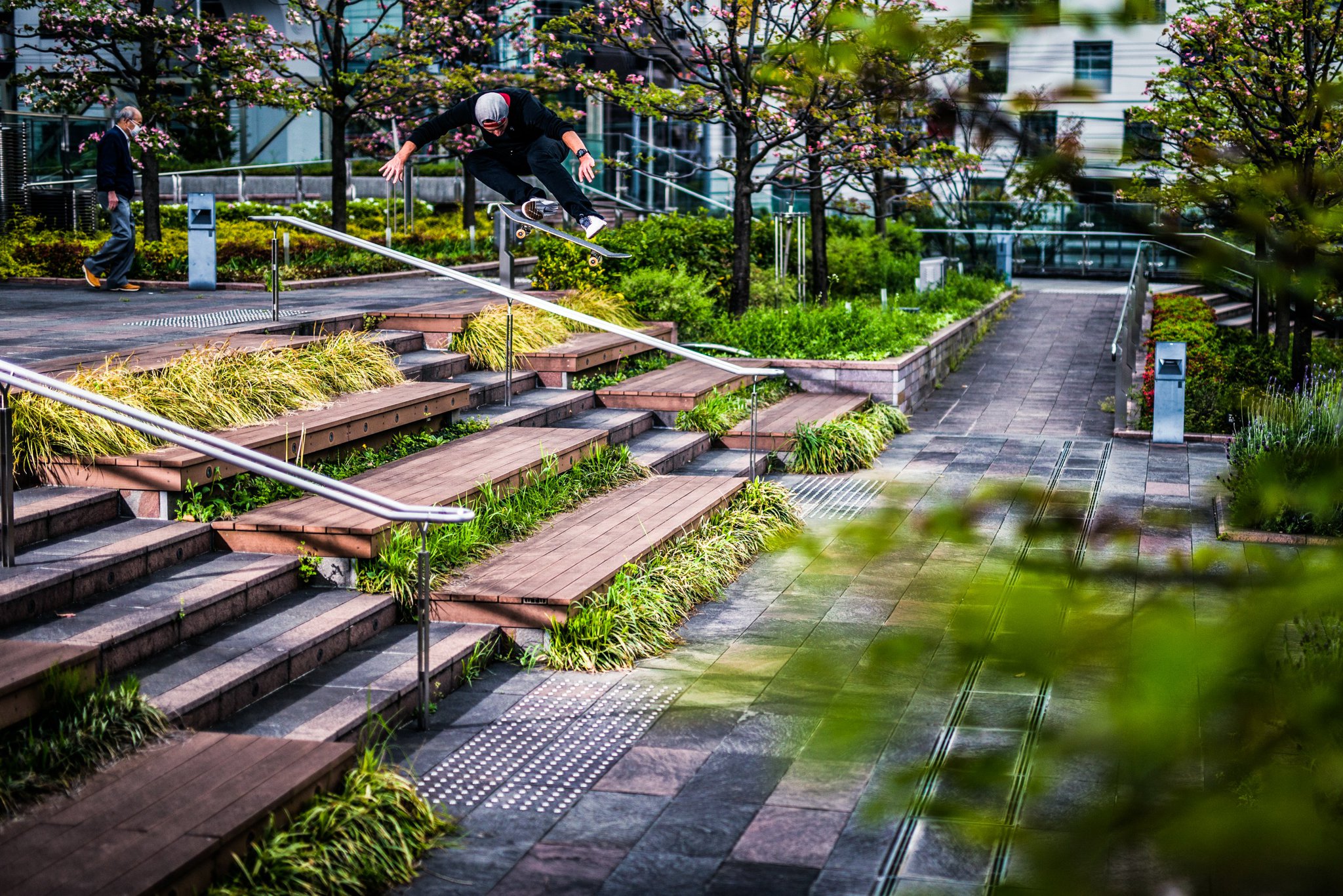
Switch heel. Photo: Markin / Red Bull Content Pool
Probably spending a year in the States at one point would be something I think would make a big difference to my skating. Shout out to Jack Fardell going pro for Sovrn, best believe I’ll be kicking it with him over in LA real soon too! I guess after I find out how everything will work at the Olympic camp I’ll be able to make up my mind on what would work and what to put into practice.
I’m going to ensure that this pursuit for the Olympics doesn’t take away from street skating. I want to get a solid video part popping off soon – 3 years means putting in work! I’m already viewed very differently as a skateboarder, doing TV stuff and all. The most important thing for me is being just a skateboarder who loves it, a skater that wants to contribute to the industry. “Training” at parks isn’t what skating’s about. I feel that even with the introduction to the Olympics, the culture, the realness of skateboarding won't be lost. I want to protect that kind of skateboarding. Fun, always fun and nothing more. Life’s way too serious anyway. It’s my release, my escape and even with my pursuit of the Olympics, if I don't stay real to these kinds of codes I think I’d simply lose my love for skating.
Yes and no. There will definitely be parents who won’t understand what filming street tricks on a VX1000 is all about. I think skateboarders are the kinds of people who make their own decisions though, you know. But with it being within the mainstream media, more people will focus on what will make them a household name, and I guess that’s skating parks really well. I grew up skating on a K-Mart board with an old tire, a piece of plywood and a street sign as a ramp, every afternoon without fail. Kids might not realise that they can learn to skate on the streets, seeing shiny skateparks on TV could change their perception from the beginning, for sure.
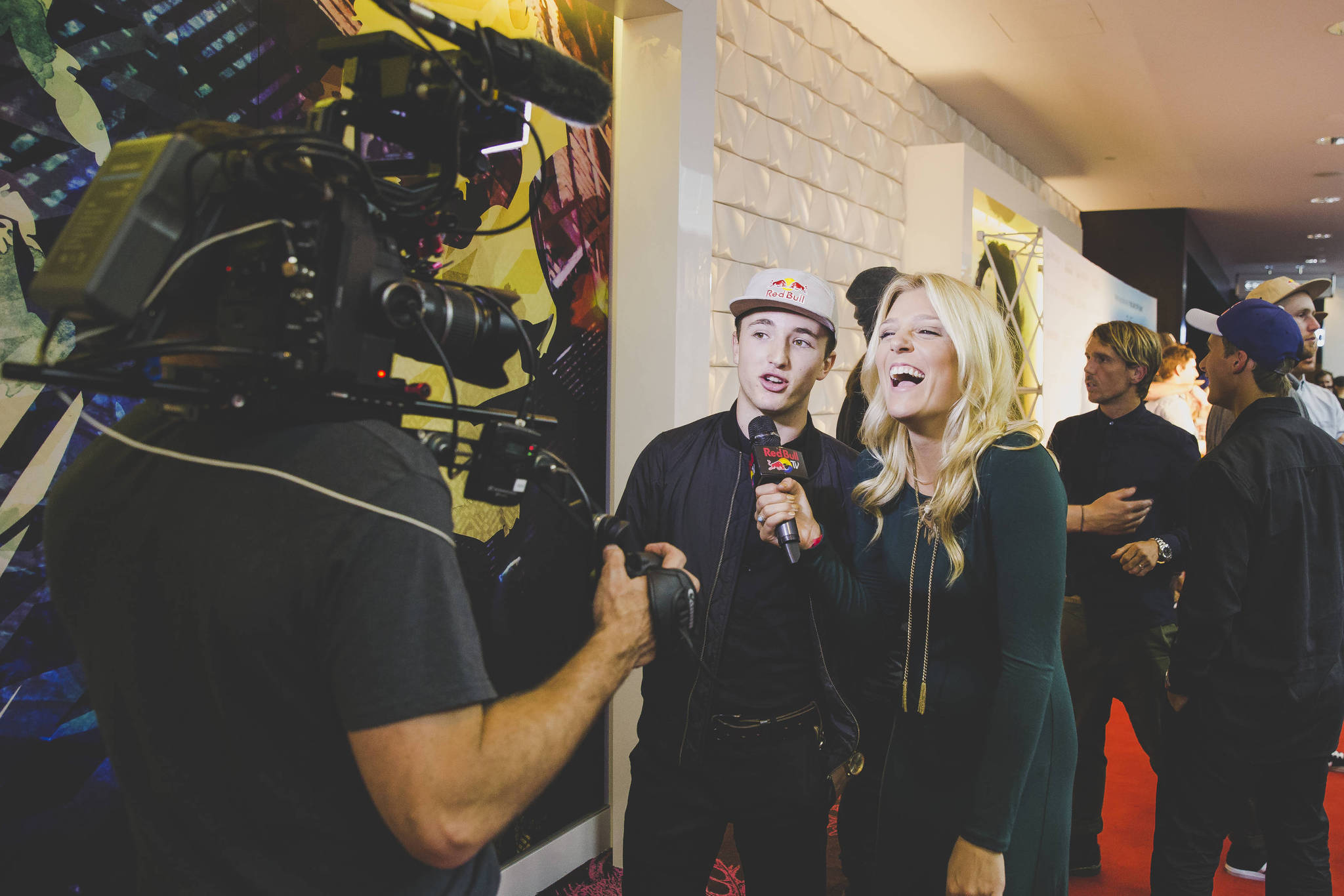
Photo: Life Without Andy / Red Bull Content Pool
Well, scholarships in my case. More opportunities, more skateparks. Creating and facilitating growth in the industry giving skate shops a solid crack. I honestly believe the pros heavily outweigh the cons. There's more opportunity for skaters and it creates a broader choice of jobs for people who want to pursue skateboarding. The underground culture side of skating is something I was raised from, and the older generation of skaters went about things in pretty destructive ways. Whether it was drinking or drugs or that kind of stuff, I think that's against the spirit of any sport in my eyes, especially as younger kids see this as the norm, and so we see a perpetual cycle. My family has been crippled by drugs and I decided to stop that cycle in my family. I'm one of the first in my family to attend university and finish high school.
I didn't really go to school growing up as I was bullied, I didn't fit in. And on top of that, I was nearly illiterate entering high school. I ditched school for most of my primary education. I had no real parental figures telling me what I can and can't do, so it made sense to me to just go skating every day and it meant that I didn't have to deal with bullies and all that. I moved in with my aunt, started high school, and realised the extent of my absence in school. I began to really appreciate what being educated means, and I knew how harsh it felt being so behind. If it weren't for the Olympics and USYD, I wouldn't have the chance to pursue that education further without sacrificing a shot at skateboarding.
Shout out to my boy Matty Garrett, we’re starting a podcast in the next few weeks! Lots of fun to be had with this!
Interview: Riely Walker
Follow us on Facebook and Instagram for more content from the skate world
It looks like you might be visiting BOARDWORLD from outside of Australia. Please note: we are an Australian store, and all orders will be charged in Australian Dollars (AUD). However, you can change the displayed prices to another international currency more relevant to you. Any displayed prices other than AUD are estimates only, based on current exchange rates. You will be charged in Australian Dollars at checkout.